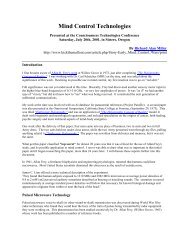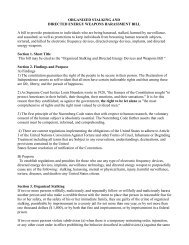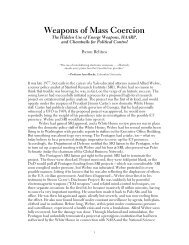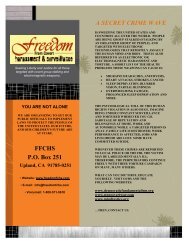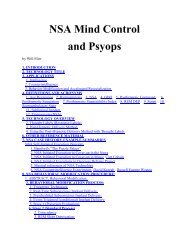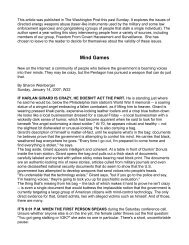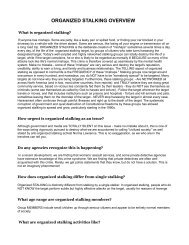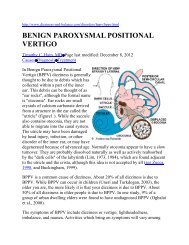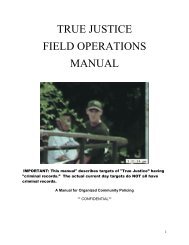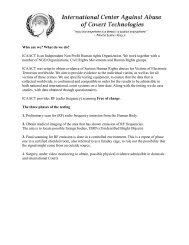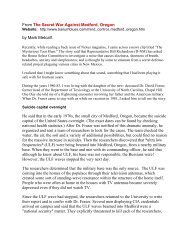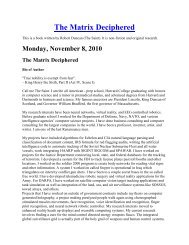Update: JESUS MENDOZA - Freedom From Covert Harassment and ...
Update: JESUS MENDOZA - Freedom From Covert Harassment and ...
Update: JESUS MENDOZA - Freedom From Covert Harassment and ...
You also want an ePaper? Increase the reach of your titles
YUMPU automatically turns print PDFs into web optimized ePapers that Google loves.
<strong>Update</strong>: <strong>JESUS</strong> <strong>MENDOZA</strong><br />
May, 2010<br />
The following Case Briefs cite specific <strong>and</strong> concrete evidence on the judicial<br />
record showing how the wireless, electric, insurance <strong>and</strong> other industries are<br />
able to manipulate federal <strong>and</strong> State agencies <strong>and</strong> courts, community<br />
organizations, <strong>and</strong> even hate groups to retaliate against those who denounce<br />
the physical harm caused by radiation. The retaliation include concerned<br />
efforts to entrap <strong>and</strong> discredit the target, mobbing, harmful satellite tracking,<br />
road harassment, <strong>and</strong> even attempts to murder in a way that appears natural,<br />
accidental or self inflicted.<br />
STATEMENT OF INTERESTED PARTIES<br />
CASE BRIEFS<br />
Jesus Mendoza, a parent of three children <strong>and</strong> other concerned parents<br />
submitted a request to make a risk evaluation of the levels of radiation found<br />
inside John Shary Elementary on the ground that high levels of radiation have<br />
been found inside the school <strong>and</strong> in close proximity to children. At first,<br />
School District Officials expressed a strong support for making a risk<br />
evaluation of the radiation found inside schools. Everything changed after<br />
they notified their insurance carrier.<br />
On March 4, 2010, during a telephonic hearing, Mendoza presented to<br />
the Sharyl<strong>and</strong> Independent School District evidence showing that our<br />
children are being exposed to levels of radiation more than twenty times the<br />
levels known to cause serious adverse health effects including physical <strong>and</strong><br />
mental disabilities, leukemia including cancer. Evidence presented include a<br />
high number of children <strong>and</strong> teachers reporting illness. (1855 students <strong>and</strong> a<br />
high percentage of teachers have reported illness within a five month period.<br />
The student population is 700). The District’s Superintendent, Mr. Scott<br />
Owings claimed that flue was causing the high number of sickness, claimed<br />
that harm by radiation is imaginary adopting the statements of a scientist in<br />
the payroll of the wireless industry who has been accused of research fraud to<br />
conceal the real effects of exposure to radiation, <strong>and</strong> introduced as evidence
excerpts of Case Briefs cited below to discredit the legitimacy of the<br />
Grievance. Hearing Officer Yasmine Nye attempted to exclude scientific<br />
studies showing the high risk taken by our children when exposed to<br />
radiation found inside schools, did not allow further measurements of<br />
radiation inside the school, did not allow testimony of expert witnesses,<br />
declined to notify parents of students with medical problems, <strong>and</strong> adopted the<br />
statements of Mr. Owings to deny the relief requested. (Evidence<br />
introduced in response to Mr. Owings claims include evidence showing<br />
that the radiation used inside the schools is the same type of radiation<br />
blamed for causing severe physical harm to police officers, firemen,<br />
electrical worker, <strong>and</strong> soldiers).<br />
See copy of Flyer below<br />
Jesus Mendoza suffers of a debilitating <strong>and</strong> painful health condition<br />
somehow similar to the health condition suffered by the kid on the movie the<br />
“Bubble Boy.” Mendoza is highly sensitive to electricity. Electrical<br />
sensitivity is a debilitating <strong>and</strong> painful health condition caused by<br />
overexposure to radiation that is reaching epidemic proportions. See the<br />
Physician’s Statement of Disability issued by the Texas Aging <strong>and</strong> Disability<br />
Services which describes some of the limitations caused by electrical<br />
sensitivity. Exhibit “1" to Request ot Appear by Teleconference. See<br />
excerpts to The Electrical Sensitive H<strong>and</strong>book, Exhibit “6" to Request ot<br />
Appear by Teleconference. See Section 1 tot he Bioinitiative Report<br />
Exhibit “1" to Supplement to Grievance 1. Mendoza’s immune system<br />
lost the ability to tolerate electricity on the environment. Exposure to<br />
radiation emitting devices including power lines, flourescent lights, electrical<br />
motors, <strong>and</strong> wireless devices cause among other things, pain, swelling of vital<br />
organs, breathing problems, concentration <strong>and</strong> speech problems. Exhibit<br />
“2" to Request ot Appear by Teleconference shows loss of skin <strong>and</strong> how<br />
swelling inside the skull is pushing one eye out of place. Among other<br />
things, Mendoza’s ability to work, to travel long distances <strong>and</strong> to be inside<br />
buildings have been substantially impaired. Mendoza has been violently ill<br />
several times, Mendoza is in pain all the time Exhibit “3" is a Decision of<br />
the Social Security Administration finding Mendoza’s electromagnetic<br />
sensitivity a severe impairment. Exhibit “4" to Request ot Appear by<br />
Teleconference shows life threatening swelling of heart after Mendoza<br />
stayed inside a building for extended period of time. Exhibit “6" is a Motion
<strong>and</strong> Order by a State District Judge allowing Mendoza to Appear by<br />
Teleconference to Judicial Proceedings as an accommodation to his electrical<br />
sensitivity. Exhibit “7" to Request ot Appear by Teleconference are<br />
excerpts of an interview of the former President of the World Health<br />
Organization describing symptoms of her sensitivity to electricity.<br />
Jesus Mendoza’s electrical sensitivity was caused by malicious<br />
overexposure to radiation as retaliation for denouncing judicial corruption.<br />
On May of 1995, Jesus Mendoza started to study law at the second largest<br />
law school in the country at The Thomas M. Cooley Law School in<br />
Lansing, Michigan. Mendoza made the Dean’s list <strong>and</strong> was elected<br />
President of the Hispanic Law Society for one term. During Mendoza’s<br />
second year of law school, Mendoza presented to the Dean of the law school,<br />
Don Leduc, a former attorney for the US Dept. of Justice concrete <strong>and</strong><br />
specific evidence showing how the President of the law school <strong>and</strong> former<br />
Chief Justice of the Michigan Supreme Court Thomas E. Brennan <strong>and</strong><br />
Michigan Court of Appeals Roman S. Briggs were using the school to<br />
defraud students of their federal loans while giving away law degrees to those<br />
affiliated with government agencies. Neither Judge Brennan, nor Judge<br />
Briggs denied or engaged the evidence of fraud. Instead, Mendoza was the<br />
subject of pervasive harassment, illegal searches, attempts of entrapment, <strong>and</strong><br />
attempts to run over. On October of 1997, Mendoza was found with<br />
unexplained swollen heart at the emergency room. On July 13, of 1998 two<br />
individuals were trying to brake into Mendoza’s apartment around 3:00 am.<br />
The same day, Mendoza left the state <strong>and</strong> returned home, Mission, Texas.<br />
Mendoza left the law school in full compliance with the Honor Code <strong>and</strong> in<br />
good academic st<strong>and</strong>ing. See <br />
http:www.motherboard.tv/2009/7/27/the-electronic-persecution-of-jesusmendoza<br />
Exhibit “8" is a Letter of a State legislator asking colleagues <strong>and</strong> friends to<br />
help victims of organized stalking <strong>and</strong> electronic aggression. See<br />
http://www.freedomfchs.com/repjimguestltr.pdf<br />
Organized Stalking is a concerted effort to retaliate against those who<br />
denounce injustice. Members of these vigilant hate groups can be found on<br />
schools, universities, hospitals, congregations <strong>and</strong> even on the courts, <strong>and</strong><br />
disguise themselves as members of Concerned Citizens Groups,
Neighborhood Watch, Community Organizations, etc. See<br />
http://www.multistalkervictims.org/terstalk.htm<br />
On February of 1999, Jesus Mendoza filed a law suit in the Southern<br />
District of Texas, Mcallen Division against the law school officials <strong>and</strong><br />
named <strong>and</strong> unnamed government agents seeking redress for the injuries<br />
caused by the retaliation. The late US District Judge Filemon Vela assigned<br />
US Magistrate Judge Dorina Ramos to the case. Judge Ramos ordered the<br />
transfer of the case from Mcallen Texas, to the US District Court in Gr<strong>and</strong><br />
Rapids, Michigan, despite conclusive evidence on the record showing that the<br />
Defendants had committed fraud <strong>and</strong> retaliation within the state of Texas;<br />
despite conclusive evidence on the record showing that the law school<br />
Defendants had made false statements on their filings to remove the case to<br />
the state of Michigan; <strong>and</strong> despite medical evidence showing that the injuries<br />
caused by the Defendants’ retaliation had impaired Mendoza’s ability to<br />
travel long distances.<br />
After a Motion for Summary Judgment established the Defendants<br />
fraud <strong>and</strong> retaliation, the Defendants took advantage of Mendoza’s<br />
aggravated health condition by scheduling a deposition that Mendoza could<br />
not attend. US District Judge Robert Holmes Bell declined to consider<br />
concrete, specific <strong>and</strong> conclusive evidence on the record of the fraudulent<br />
conduct of Judge Brennan <strong>and</strong> Judge Briggs <strong>and</strong> dismissed the case as a<br />
sanction for Mendoza’s failure to attend the deposition. Jesus Mendoza<br />
Maldonado v. The Thomas M. Cooley Law School, et al, Southern Dist. of<br />
Texas US Dist. of TX, Mcallen, Division, Case M-99-77; Jesus Mendoza<br />
Maldonado v. The Thomas M. Cooley Law School, et al, US Dist. Court for<br />
the Western. Dist. MI., Case No. 5: 01cv93.<br />
Mendoza was displaced from his home after power lines <strong>and</strong><br />
transformer placed a few feet from his home were aggravating Mendoza’s<br />
health condition. After diagnosing Mendoza’s electrical sensitivity, Dr.<br />
William Rea did not respond to Mendoza’s requests for further evaluations<br />
<strong>and</strong> treatment. Mendoza filed a law suit against Dr. Rea <strong>and</strong> against Central<br />
Power <strong>and</strong> Light, CPL after CPL refused to make an inexpensive relocation<br />
of the power lines <strong>and</strong> transformer claiming that removal would set a<br />
precedent. The case was assigned to State District Judge Leticia Lopez.<br />
Judge Lopez advised Mendoza to dismiss the case if Mendoza could not
appear in person to court. Mendoza’s health condition aggravated <strong>and</strong><br />
dismissed the case. Jesus Mendoza v. William Rea et. al. Hidalgo County<br />
389 th District Court, Cause No. C-1615 - 02-H.<br />
At that time, an appeal of the dismissal of the case against Judge<br />
Brennan <strong>and</strong> Judge Briggs was pending before the federal court of appeals in<br />
Cincinnati, Ohio. Documents submitted by Judge Brennan <strong>and</strong> Judge Briggs<br />
in response to Mendoza’s appeal include documents filed by Mendoza on the<br />
law suit against Central Power <strong>and</strong> Light in Texas State District Court. The<br />
documents were fax stamped by the office of CPL’s counsel in Harlingen,<br />
Texas. On 2003, a Panel of the Federal Court of Appeals for the Six<br />
Circuit, composed of Judge Boggs, <strong>and</strong> Daughtrey, <strong>and</strong> Oberdorfer,<br />
District Judge declined to consider conclusive evidence on the record of<br />
fraud on the courts by Judge Brennan <strong>and</strong> Judge Briggs. Jesus Mendoza<br />
Maldonado v. The Thomas M. Cooley Law School, et al, US Court of<br />
Appeals for the Sixth Circuit, Case No. 02-2095.<br />
(On the year 2008, despite Mendoza’s opposition, American Electric<br />
Power, the successor of CPL placed another set of power lines <strong>and</strong> a<br />
humming transformer less than five feet away from Mendoza’s place).<br />
A Newsletter of Environmental Health Center-Dallas dated April 2008 states<br />
in part: “For the past three years, the Texas Medical Board, acting under<br />
pressure from the insurance companies, is trying to disallow the practice of<br />
Environmental Medicine by relentless attacking the integrity <strong>and</strong><br />
professional knowledge of Dr. Rea. And now, that of many other physicians<br />
who also offer Environmental Medical treatment.”<br />
On the year 2003, Mendoza filed a law suit against the US Attorney<br />
General John Ashcroft seeking an order to cease <strong>and</strong> desist from subjecting<br />
Mendoza <strong>and</strong> his family to electronic surveillance after Mendoza saw his<br />
children with seizure <strong>and</strong> convulsions in the middle of the night while meters<br />
showed high intensities of radiation inside the home. Maldonado v<br />
Ashcroft, US Dist. Court for the Southern Dist. of Texas, Mcallen Division,<br />
Case No. M 03-038). US District Judge Ricardo H. Hinojosa assigned US<br />
Magistrate Judge Dorina Ramos to the case. Judge Ramos impaired<br />
Mendoza’s ability to present expert witnesses on a hearing on Mendoza’s
application for a Temporary Restraining Order against the US Attorney<br />
General. Judge Ramos recused herself in response to a motion to recuse<br />
citing concrete <strong>and</strong> specific evidence on the record of her judicial misconduct<br />
to benefit Judge Brennan <strong>and</strong> Judge Briggs. US District Judge Ricardo H.<br />
Hinojosa reassigned Judge Ramos to the case.<br />
At the hearing on Mendoza’s application for a Temporary Restraining<br />
Order, Mendoza’s wife testified as to how her children scream in pain when<br />
detection equipment indicates high levels of radiation inside the home, <strong>and</strong><br />
how the readings on radiation meters decrease when Mendoza attempted to<br />
record the occurrence on a video camera. Mendoza’s wife, brother <strong>and</strong><br />
oldest daughter testified to Mendoza’s law abiding <strong>and</strong> mental stability.<br />
Judge Ramos altered the testimony of Mendoza’s wife to discredit evidence<br />
of the electronic aggression <strong>and</strong> to imply that Mendoza is delusional. On July<br />
15, 2003, on a Report <strong>and</strong> Recommendation to dismiss the case Judge<br />
Ramos stated: “Silvia Mendoza, who is Plaintiff’s wife, testified that<br />
Plaintiff’s has trouble breathing, among other things. She also testifed<br />
that Plaintiff’s difficulty seems to subside when he operates a camera.”<br />
Judge Hinojosa declined to consider specific <strong>and</strong> concrete evidence on the<br />
record of Judge Ramos’ alteration of testimony <strong>and</strong> dismissed the case.<br />
Docket 29, Docket No. 32, at 5; Statement of Evidence, <strong>and</strong> Affidavit in<br />
which Mendoza’s wife denies giving that testimony, Docket No. 40;<br />
(Maldonado v Ashcroft, US Dist. Court for the Southern Dist. of Texas,<br />
Mcallen Division, Case No. M 03-038).<br />
During the litigation, the US Attorney General did not engage or<br />
opposed evidence on the record of the judicial misconduct of Judge Ramos<br />
<strong>and</strong> Judge Hinojosa; did not deny the fact that Mendoza was the subject of an<br />
investigation; claimed that everybody is exposed to radiation; did not engage<br />
or oppose an Affidavit of a former government agent who was sent to the<br />
emergency room with internal bleeding every time he offered to testify in<br />
court to Mendoza’s claim of electronic aggression <strong>and</strong> mental stability; did<br />
not engage or oppose evidence showing how three agents of the Federal<br />
Bureau of Investigation Mark Miller, Michael Rodriguez, <strong>and</strong> Jeffrey<br />
Schrimer, were caught harassing Mendoza on a restricted area at Mendoza’s<br />
workplace, an elementary school, a day after Mendoza attempted to file a<br />
criminal complaint against officers of the Thomas M. Cooley Law School;
did not engage or oppose video tape evidence showing radiation directed<br />
into Mendoza’s home <strong>and</strong> the pain <strong>and</strong> suffering caused on Mendoza <strong>and</strong> his<br />
children. During the litigation counsel for the US Attorney General, David L<br />
Guerra claimed that ionizing radiation can be used for surveillance of homes<br />
despite evidence that the radiation was causing harm to children <strong>and</strong> did not<br />
engage or oppose evidence on the record showing how federal agencies are<br />
using radiation surveillance technologies otherwise reserved for the military<br />
<strong>and</strong> national security to retaliate against those who denounce injustice.<br />
On appeal, a panel composed by US Circuit Judges Reavley,<br />
Wiener, <strong>and</strong> Benavides recognized Mendoza’s sensitivity to electricity, the<br />
harm caused to Mendoza by the malicious overexposure to radiation.<br />
However, the panel declined to address the misconduct of Judge Hinojosa<br />
<strong>and</strong> Judge Ramos <strong>and</strong> affirmed the dismissal because the evidence could not<br />
connect Mendoza’s injuries to the US Attorney General. The same panel<br />
denied the Petition for Rehearing in Banc. The US Supreme Court declined<br />
to intervene. Maldonado v Ashcroft, US Court of Appeals for the Fifth<br />
Circuit Case No. 04-40095. Jesus Mendoza Maldonado v Alberto R.<br />
Gonzales, U.S. S. Ct., Case No. 04-9908.<br />
Mendoza filed Complaints of Judicial Misconduct against Judge<br />
Ramos <strong>and</strong> Judge Hinojosa. The Chief Judge of the US Court of Appeals for<br />
the Fifth Circuit, Carolyn Dineen King, declined to consider specific <strong>and</strong><br />
concrete <strong>and</strong> conclusive evidence on the federal record of the judicial<br />
misconduct of Judge Ramos <strong>and</strong> Judge Hinojosa. On October of 2004,<br />
Judge E. Grady Jolly signed an Order affirming the dismissal of the<br />
Complaints of Judicial Misconduct against Judge Ramos <strong>and</strong> Judge<br />
Hinojosa. (Complaints of Judicial Misconduct Nos. 04-05-372-0089 <strong>and</strong><br />
90).<br />
On 2006, after examining video tapes, an investigator of the City of<br />
Mission Police Department concluded that Mendoza <strong>and</strong> his children had<br />
been victims of an electronic aggression. Another investigator notified<br />
Mendoza that the Federal Bureau of Investigation had directed the City of<br />
Mission Police Department no to intervene because Mendoza was the<br />
subject of an investigation by the Central Intelligence Agency. Based on<br />
these facts, <strong>and</strong> the facts established by the litigation against the US Attorney
General, Mendoza filed a lawsuit in Washington, D.C. The lawsuit sought an<br />
Order to compel the Defendants to cease <strong>and</strong> desist from using radiation<br />
surveillance during any investigation of Mendoza’s activities, <strong>and</strong> to show<br />
cause for the investigation. Evidence to the Original Complaint included<br />
pictures of detection equipment showing high intensities of radiation <strong>and</strong> the<br />
pain <strong>and</strong> suffering caused on Mendoza’s children. See Maldonado v<br />
Alex<strong>and</strong>er et al, Supreme Court of the United States Case No. 06-9569<br />
Exhibit “1" at http://jesusmendozza.blogspot.com/<br />
Without a hearing, <strong>and</strong> without allowing the Defendants to respond, US<br />
District Judge Richard W. Roberts, dismissed the Complaint as delusional<br />
or fantastic.<br />
On November 21, 2006, Ginsburg, Chief Judge, <strong>and</strong> R<strong>and</strong>olph <strong>and</strong><br />
Tatel, Circuit Judges denied the Petition for Rehearing. The same day,<br />
Ginsburg Chief Judge, <strong>and</strong> Sentelle, Henderson, R<strong>and</strong>olph, Rogers, Tatel,<br />
Garl<strong>and</strong>, Brown, <strong>and</strong> Kavanaugh, denied the Petition for Rehearing in<br />
Banc. (Judge Brett Kavanaugh, while working as White House aid, was<br />
involved in crafting strategies to conceal from Congress the harmful use of<br />
directed radiation for domestic surveillance programs. Judge Kavanaughd<br />
has been the subject of an investigation to determine if he deceived a<br />
Congressional Committee during confirmation hearings). On June 21, of<br />
2007 the US Supreme Court declined to get involved in the case.<br />
Jesus Mendoza Maldonado v Keith Alex<strong>and</strong>er, in his official capacity as<br />
director of the National Security Agency, Michael Hayden, in his official<br />
capacity as Director of the Central intelligence Agency, <strong>and</strong> George W. Bush<br />
in his official capacity as President of the United states of America, US Court<br />
Supreme Court, Case No. 06-9569.<br />
Mendoza became a victim of pervasive harassment <strong>and</strong> vigilantism as<br />
retaliation for denouncing judicial corruption, including death threats, a<br />
drive-by- shooting <strong>and</strong> attempts to run over Mendoza <strong>and</strong> his children.<br />
Speeding vehicles yelled at Mendoza among other things that Mendoza is a<br />
child molester, a spy, <strong>and</strong> mentally insane. Mendoza filed a federal law suit<br />
in Houston, Texas against some of the identified perpetrators, Michael<br />
James Lindquist, a self proclaimed Apostle, Diane K. Smedley, a teacher at<br />
Sharyl<strong>and</strong> High School, Ruth Watkins, the wife of a teacher at Sharlyl<strong>and</strong><br />
High School, <strong>and</strong> Christopher T. Lohden a pilot for a local bank.
Although, some of the defendants did not answer the Complaint or oppose<br />
the evidence of retaliation, US District Judge Lynn N. Hughes, dismissed<br />
the case without a hearing.<br />
The defendants did not oppose the appeal or the evidence of their<br />
participation on the retaliation. On September of 2006, a panel composed of<br />
Chief Judge Jones, Judge King <strong>and</strong> Judge Dennis found the appeal<br />
frivolous <strong>and</strong> issued a warning of sanctions against Mendoza. Maldonado v<br />
Lindquist, et al, US District Court Southern District of Texas, Houston<br />
Division, Case N0. H-05-97. (US Court of Appeals for the Fifth Circuit<br />
Case No. 05-20257. (Chief Judge Carolyn Dineen King had declined to<br />
consider conclusive evidence on the record of the fraud on the court by US<br />
District Judge Ricardo H. Hinojosa <strong>and</strong> US Magistrate Dorina Ramos).<br />
On June of 2000, Mendoza’s electrical sensitivity was diagnosed at the<br />
Environmental Health Center in Dallas Texas by Dr. William Rea <strong>and</strong> Dr.<br />
Cyril Smith. On March 2003, Mendoza was involuntarily committed in error<br />
to a State Hospital after Mendoza’s mother was persuaded to believe that<br />
Mendoza was neglecting medical care for his swelling, <strong>and</strong> that a State<br />
Hospital was able to treat Mendoza’s electrical sensitivity. The stay inside<br />
the building caused Mendoza pain <strong>and</strong> breathing difficulties. Mendoza spent<br />
the night on the emergency room. The records released by the ER indicate a<br />
progressive swelling of heart <strong>and</strong> a high risk of death within a short period.<br />
Mendoza was evaluated by Dr. David Moron. Mendoza presented Dr.<br />
Moron with medical evaluations showing that Mendoza was sensitive to<br />
electricity. Dr. Moron claimed to be unfamiliar with electrical sensitivities,<br />
<strong>and</strong> claimed that Mendoza’s electrical sensitivity was delusional. Mendoza<br />
was subjected to a second evaluation by a doctor with expertise on electrical<br />
sensitivities, Dr. Cannelus Caralampus. Dr. Caralampus concluded that the<br />
only problem Mendoza had was the difficulty to explain to others that<br />
electricity causes harm to Mendoza. Mendoza was released immediately<br />
afterwards. Dr. Moron refused to include the findings of Dr. Caralampus on<br />
Mendoza’s medical records.<br />
Mendoza had applied for rehabilitative technology with the Texas<br />
Dept. of Assistive <strong>and</strong> Rehabilitative Services, DARS. During a hearing<br />
before the office of Texas State Representative Ismael “Kino”Flores, Mr.<br />
Antonio Ocanas a supervisor for DARS promised to provide Mendoza
ehabilitation technology including a shielding room as soon as another<br />
doctor confirmed Mendoza’s electrical sensitivity. After Mendoza’s<br />
electrical sensitivity was confirmed by another doctor. Mrs. Nancy Murray<br />
a counselor for DARS removed from the record documents supporting the<br />
legitimacy of Mendoza’s electrical sensitivity <strong>and</strong> mental stability <strong>and</strong><br />
attempted to certify Mendoza on a mental disability. Some of the documents<br />
removed from the record included a Decision of the Social Security<br />
Administration finding Mendoza’s electromagnetic sensitivity a severe<br />
impairment; Exhibit 3, Affidavits of persons attesting to Mendoza’s mental<br />
stability <strong>and</strong> health condition; See Exhibits 13, 14, <strong>and</strong> 15, pictures of the<br />
swelling that occur when Mendoza is exposed to electricity, <strong>and</strong> excerpts<br />
from an interview in which the President of the World Health Organization<br />
declares her sensitivity to electricity. Exhibit “7." Mrs. Murray denied<br />
Mendoza’s application for rehabilitative technology. During the<br />
Administrative hearing Mrs. Murray could not account for her case notes that<br />
supported a disability on a mental disability, did not deny the removal of<br />
material <strong>and</strong> relevant documents from the record claiming that DARS’<br />
counsel Mr. William Glenn had helped to prepare the record. Although<br />
Mendoza’s mother <strong>and</strong> wife testified to the legitimacy of Mendoza’s health<br />
condition <strong>and</strong> mental stability, Mr. Steve Aleman, the Impartial Hearing<br />
Officer denied the application for rehabilitative technology. Mendoza<br />
appealed to state district court <strong>and</strong> DARS removed the case to federal court.<br />
On a hearing before US District Judge R<strong>and</strong>y Crane, Mendoza<br />
introduced as evidence some of the documents which Mrs. Murray <strong>and</strong> Mr.<br />
Glenn had removed from the administrative record to discredit the legitimacy<br />
of Mendoza’s electrical sensitivity. During the hearing, Mendoza pointed to<br />
the Court the false statements made on the motion to dismiss by DARS<br />
counsel, the Texas Attorney General, Gregg Abbot. Abbot did not<br />
engage or oppose the evidence of fraud. Judge Crane disregarded the<br />
evidence of fraud <strong>and</strong> dismissed the case claiming that those who are not<br />
receiving disability benefits are not disabled, abrogating well established<br />
disability definitions under the American with Disabilities Act <strong>and</strong> under the<br />
Rehabilitation Act. Although Dr. Moron admitted the fact that Mendoza had<br />
a right to amend medical records under state law, Judge Crane concluded<br />
that no such right exists in the State of Texas.
Mendoza filed a motion to recuse Judge Crane pointing to specific <strong>and</strong><br />
concrete evidence of disqualification. Judge Crane did not engage or deny<br />
the evidence of judicial misconduct, claiming instead that those without an<br />
attorney are not entitled to an impartial judge, abrogating federal recusal<br />
statutes <strong>and</strong> well established precedent.<br />
On June of 2007, US Circuit Judges Jolly, Dennis, <strong>and</strong> Clement, declined<br />
to consider evidence of Judge Crane judicial misconduct <strong>and</strong> issued another<br />
warning of sanctions. Jesus Mendoza v Dr. David Moron, et al, US District<br />
Court for the Southern District of Texas, Mcallen Division, Case No. 7 05-<br />
CV-184; US Court of Appeals for the Fifth Circuit, Case No. 06-40671.<br />
(Circuit Judges Jolly <strong>and</strong> Dennis had declined to consider evidence of fraud<br />
on the court by Judge Hinojosa <strong>and</strong> Judge Ramos).<br />
On 2009, In light of the aggravation of his health condition, Mendoza<br />
filed another application for assistive technology with DARS submitting<br />
further evidence of the legitimacy of his electrical sensitivity. See Exhibits 1<br />
<strong>and</strong> 2. The case was assigned to Francisco Coronado, a counselor for<br />
DARS. On the initial interview Mr. Coronado claimed that the application<br />
was to be denied because DARS does not recognize electrical sensitivities as<br />
a disability. Without more, Mr. Coronado denied Mendoza’s application, <strong>and</strong><br />
Mendoza filed an administrative appeal. In response to a request to produce<br />
the record, Mr. Coronado submitted what purports to be a record including a<br />
sworn Affidavit claiming that Mendoza had refused to see other doctors <strong>and</strong> a<br />
psychiatrist. Mendoza submitted evidence showing that the statements that<br />
Mr. Coronado claimed on his Affidavit were his case notes, were in fact<br />
statements copied by Mr. Coronado from a doctor’s letter sent to Mrs.<br />
Murray on the year 2002. See Exhibits 9, 10.<br />
On a hearing before the Impartial Hearing Officer Mr. John<br />
Buffington. Mr. William Glenn counsel for DARS did not oppose or engage<br />
evidence showing that Mr. Glenn had participated with Mr. Murray in<br />
malicious exclusion of evidence from the record to discredit the legitimacy of<br />
Mendoza’s disability <strong>and</strong> mental stability did not oppose or engage evidence<br />
on the record of Mr. Coronado’s perjury to discredit the legitimacy of<br />
Mendoza’s disability <strong>and</strong> mental stability, claiming instead without offering<br />
any evidence that DARS does not recognize electrical sensitivities as a<br />
disability, that Mendoza’s claim was barred by the previous court ruling, <strong>and</strong>
that Mendoza has a mental problem. Mr. Buffington rejected DARS’s<br />
claims <strong>and</strong> scheduled a Due Process Hearing. Mr. Buffington declined to<br />
recuse Mr. Glenn from the case.<br />
Before the Due Process Hearing Mr. Glenn offered Mendoza to<br />
provide the necessary technology for rehabilitation if Mendoza agreed to<br />
rem<strong>and</strong> the case to an impartial counselor <strong>and</strong> to be evaluated by another<br />
doctor with expertise in electrical sensitivities. Mendoza refused the offer<br />
after the offer in writing did not include the terms offered by Mr. Glenn.<br />
After Mendoza rejected the offer for a voluntary rem<strong>and</strong>, Mr. Glenn called<br />
Mendoza saying that the case was to be rem<strong>and</strong>ed to Mr. Coronado where<br />
Mendoza was to subjected to a series of physical <strong>and</strong> mental examinations<br />
by doctors unfamiliar with electrical sensitivities. Mr. Glenn submitted a<br />
motion to rem<strong>and</strong> the case back to Mr. Coronado. Without a Due Process<br />
Hearing, Mr. Buffington rem<strong>and</strong>ed the case to Mr. Coronado, <strong>and</strong> Mendoza<br />
appealed to state court.<br />
On a hearing before state district judge Gus Strauss, counsel for<br />
Texas Attorney General Gregg Abbott did not engage or deny the evidence of<br />
perjury by Mr. Coronado to discredit the legitimacy of Mendoza’s health<br />
condition <strong>and</strong> mental stability. See Exhibits 9, 10. During the hearing,<br />
counsel for DARS made several statements which falsity can be verified by<br />
the record itself, including a claim that Mendoza had not filed the law suit on<br />
a timely manner. Judge Strauss adopted Abbott’s statements <strong>and</strong> dismissed<br />
the case for lack of jurisdiction. Mendoza filed a motion to recuse Judge<br />
Strauss. The Texas Attorney General did not oppose the motion to recuse or<br />
engaged the evidence of fraud on the court. Judge Strauss did not recuse or<br />
refer the motion to an administrative judge as required by state law, <strong>and</strong><br />
instead reassigned the case to another judge. On a hearing before State<br />
district Judge Rhonda Hurley, the Texas Attorney General did not engage or<br />
oppose the evidence of the perjury committed by Mr. Coronado to discredit<br />
the legitimacy of Mendoza’s disability <strong>and</strong> mental stability, <strong>and</strong> did not<br />
engage or oppose evidence f the falsity of statements made to before Judge<br />
Strauss Court. Judge Hurley declined to consider the evidence of fraud on<br />
the court adopted the findings of Judge Strauss <strong>and</strong> declined to state the<br />
findings of fact that support a dismissal of the case. An appeal is pending.<br />
Jesus Mendoza v. the Texas Department of Assistive <strong>and</strong> Rehabilitative
Services, 345 th District Court, Travis County, Texas CAUSE No. D-1-GN-<br />
09-002538.<br />
Dr. Pedro S. Montano, a doctor familiar with Mendoza’s health<br />
condition filed a law suit against Mendoza claiming that rats had damaged<br />
the interior of a vehicle that Dr. Montano had left at Mendoza’s property for<br />
more than five years breaching a promise to supply the necessary parts for<br />
repair. Before filing the law suit, Dr. Montano’s counsel, Carlos Ortegon, a<br />
municipal judge in Alton, Texas admitted that there was no basis for the law<br />
suit. Both, Judge Ortegon <strong>and</strong> Dr. Montano claimed an ability to manipulate<br />
the courts. Justice of the Peace Jose Ismael “Melo” Ochoa compelled<br />
Mendoza’s attendance to trial in person under penalty of arrest despite<br />
medical documentation showing that a stay inside the building was to cause<br />
severe physical harm to Mendoza. At trial, Judge Ochoa allowed counsel for<br />
Dr. Montano to select as jurors persons that had declared their inability to<br />
render a fair verdict. Dr. Daniel Charles Brown claimed to be a friend of Dr.<br />
Montano, <strong>and</strong> Maria Lourdes Gonzalez claimed that she had been involved<br />
in repossession of a car by mechanics. At trial Dr. Montano failed to<br />
produce any evidence of damage caused to the vehicle by rats, Judge Ochoa<br />
refused to submit Mendoza’s counterclaim to the jury <strong>and</strong> signed a judgement<br />
in favor of Dr. Montano for more than four thous<strong>and</strong> dollars. Pedro S.<br />
Montano MD. v Jesus Mendoza, Justice of the Peace Court, Pct. 3 Pl. 2,<br />
Hidalgo County Texas Case No. C-06-095MO.<br />
On a new trial on County Court, Dr. Montano did not respond to<br />
discovery aimed to establish the fact that Dr. Montano’s law suit was<br />
fraudulent. County Court, Judge Jaime Palacios did not allow Mendoza to<br />
appear by telephonic conference on a Motion for Sanctions against Dr.<br />
Montano, <strong>and</strong> Mendoza filed a motion to recuse. Judge Palacios recused<br />
himself.<br />
The case was assigned to County Court Judge Albert Garcia. Judge<br />
Garcia recused himself in response to a motion to recuse that included<br />
evidence of collusion with Dr. Montano to take advantage of Mendoza’s<br />
disability <strong>and</strong> to dismiss the case. Administrative Judge Manuel Banales<br />
assigned a visiting judge to the case. Dr. Montano dismissed his claim<br />
against Mendoza after defaulting on discovery <strong>and</strong> filed for bankruptcy in
federal court staying a hearing on a motion for sanctions. Pedro S. Montano<br />
MD, v. Jesus Mendoza, County Court at Law 6, Hidalgo County, Texas Case<br />
No. CL-06-3256-F. See<br />
Mendoza filed a law suit against Dr. Montano <strong>and</strong> against Judge Ochoa<br />
seeking redress for violations of Mendoza’s civil rights <strong>and</strong> aggravation of<br />
Mendoza’s health condition when he was compelled to stay inside a building<br />
at trial. After defaulting on discovery on County Court, Dr. Montano <strong>and</strong><br />
Judge Ochoa filed a forged an “Agreed Motion to Dismiss.” The same<br />
day, State District Judge Noe Gonzalez dismissed the case. Mendoza filed a<br />
Motion to vacate the judgement <strong>and</strong> for sanctions, including a copy of the<br />
forged “Agreed Motion to Dismiss.” See Exhibits 11, 12. Neither Judge<br />
Ochoa nor Dr. Montano opposed the evidence of fraud on the court. Judge<br />
Gonzalez did not allow Mendoza to appear by teleconference on a hearing to<br />
vacate the dismissal <strong>and</strong> for sanctions against Dr. Montano <strong>and</strong> against Judge<br />
Ochoa, <strong>and</strong> Mendoza appealed. Neither Judge Ochoa nor Dr. Montano<br />
opposed the appeal or the evidence of fraud on the courts. However, Court<br />
of Appeals Justice Rose Vela declined to consider the specific, concrete <strong>and</strong><br />
conclusive evidence on the record of Judge Ochoa <strong>and</strong> Dr. Montano’s fraud<br />
on the courts <strong>and</strong> dismissed the appeal. The Texas Supreme Court denied the<br />
Petition for Review. Jesus Mendoza v Pedro S. Montano MD, <strong>and</strong> JP<br />
Ismael Ochoa, 13 th Court of Appeals,, Case No. 13-07-00146-CV.<br />
On January 3, 2008 Mendoza filed a Petition to remove Justice of the<br />
Peace Ismael “Melo” Ochoa on the ground that specific, concrete <strong>and</strong><br />
conclusive evidence on the record supported Mendoza’s claim that Judge<br />
Ochoa colluded with Dr. Montano to obtain a fraudulent judgement <strong>and</strong> then<br />
to file a forged “Agreed Motion to Dismiss” a cause of action brought by<br />
Mendoza against Judge Ochoa <strong>and</strong> Dr. Montano. Jesus Mendoza v. Justice<br />
of the Peace Ismael “Melo” Ochoa, 398 th District Court, Hidalgo, Texas<br />
Cause No. C-013-08-I.<br />
The Petition was assigned to the 398 th District Court, presided by<br />
District Judge Aida Salinas Flores, who in turn reassigned the cause to the<br />
370 th District Court presided by District Judge Noe Gonzalez. Mendoza filed<br />
a Motion to recuse Judge Gonzalez from the case <strong>and</strong> to assign a visiting<br />
judge. Judge Gonzalez reassigned the Petition to the 398 th District Court.<br />
Judge Flores did not allow Mendoza’s Motion to appear by telephonic<br />
conference to judicial proceedings. Mendoza filed a Motion to recuse Judge<br />
Flores. Judge Flores declined to recuse herself. On April 11, 2008 the
Administrative Judge for the Fifth Region Manuel Banales recused Judge<br />
Flores <strong>and</strong> assigned District Judge Migdalia Lopez to the Petition.<br />
Mendoza filed a Motion to recuse Judge Lopez afer Judge Lopez did<br />
not allow Mendoza to appear by teleconference to judicial proceedings.<br />
Before the hearing on the motion to recuse, Judge Lopez agreed to<br />
accommodate Mendoza’s disability. At the hearing before Judge Banales,<br />
Mendoza withdrew the motion to recuse, <strong>and</strong> Judge Lopez issued an Order<br />
allowing Mendoza to appear by teleconference to judicial proceedings as an<br />
accommodation to his disability. See Exhibit “6." Without a hearing Judge<br />
Lopez denied Mendoza’s Motion to issue citation on Mendoza’s Petition to<br />
remove Judge Ochoa from office <strong>and</strong> Mendoza filed a motion to recuse Judge<br />
Lopez. During the hearing to recuse Judge Lopez, Judge Ochoa did not<br />
engage or oppose the evidence of judicial misconduct, official oppression,<br />
<strong>and</strong> fraud on the courts, Judge Manuel Banales denied the motion to recuse<br />
Judge Lopez. Without a hearing Judge Lopez denied Mendoza’s motion for<br />
reconsideration of the Petition to remove from office Judge Ochoa.<br />
The 13 th Court of Appeals declined jurisdiction, <strong>and</strong> Mendoza, filed a<br />
Motion to recuse from the appeal Chief Judge Rogelio Valdez, Judge<br />
Linda Reyna Yanes, Judge Nelda V. Rodriguez, Judge Dori Contreras<br />
Garza, Judge Gina M. Benavides, <strong>and</strong> Judge Rose Vela on the ground that<br />
they had refused to consider specific, concrete, <strong>and</strong> conclusive evidence on<br />
the record of fraud on the lower courts. Judge Ochoa did not oppose the<br />
Motion to recuse nor engage the evidence of his fraud on the courts. The<br />
motion to recuse was denied. The Texas Supreme Court denied Mendoza’s<br />
Petition for Review. Jesus Mendoza v. Justice of the Peace Ismael “Melo”<br />
Ochoa, 398 th District Court, Hidalgo, Texas Cause No. C-013-08-I; Court of<br />
Appeals Thirteen District of Texas Cause No. 13-08-00588-CV.<br />
An Administrative Law Judge for the Social Security Administration<br />
found Mendoza’s electrical sensitivity, a severe impairment. See Exhibit<br />
“3." However the Social Security Administration denied Mendoza’s<br />
application for disability benefits claiming that Mendoza could find<br />
employment on desolate <strong>and</strong> deserted areas of the country. Mendoza<br />
appealed to federal district court. US District Judge Ricardo H. Hinojosa<br />
assigned the case to US Magistrate Judge Peter E. Ormsby.
On their Motion to dismiss, the Social Security Administration made<br />
several false statements including a claim that Mendoza had been working at<br />
the time when Mendoza’s health condition aggravated to the point that<br />
Mendoza could breath only by lying flat on the floor.<br />
On a telephonic hearing on November 21, 2005, the Social Security<br />
Administration did not oppose evidence of the false statements made on their<br />
motion for summary judgement. Judge Ormsby expressed his sympathy for<br />
Mendoza’s case <strong>and</strong> implied that a favorable recommendation was to be<br />
issued soon. During the year 2006, the Clerk of the district court claimed<br />
that a Report <strong>and</strong> Recommendation had been issued but had not been entered,<br />
<strong>and</strong> then claimed that a Recommendation had not been issued.<br />
Judge Ormsby declined to consider the findings of doctors that had examined<br />
<strong>and</strong> diagnosed Mendoza’s electrical sensitivity, adopted the findings of<br />
doctors unfamiliar with electrical sensitivities that never examined<br />
Mendoza’s health condition, <strong>and</strong> adopted the false statements of the Social<br />
Security Administration to issue a Recommendation to dismiss the case.<br />
Mendoza filed objections to Judge Ormsby Recommendation. The<br />
next day Judge Hinojosa dismissed the case. Pending before the court is a<br />
an unopposed motion to recuse Judge Hinojosa <strong>and</strong> a Motion for<br />
Reconsideration. Jesus Mendoza Maldonado v The Social Security<br />
Administration, US Dist. Ct. S. Dist of TX., Mcallen Division, Case No. M-<br />
05-133).<br />
Mendoza had been provided accommodations to his disability to do<br />
research on the library of the local university. The University of Texas Pan-<br />
American denied Mendoza access to the library after Mendoza filed a case<br />
against Dr. Moron <strong>and</strong> the Texas Dept. of Assistive <strong>and</strong> Rehabilitative<br />
Services. Mendoza sought redress in federal court. US District Judge<br />
R<strong>and</strong>y Crane dismissed the case claiming in essence that those who do not<br />
receive Social Security disability benefits are not entitled to disability<br />
accommodations on public places, abrogating the American with Disabilities<br />
Act <strong>and</strong> Rehabilitation Act. Judge Crane lifted procedural obstacles to appeal<br />
the case after Mendoza sough Congressional help. Mendoza sought<br />
certification that the appeal is not frivolous citing concrete <strong>and</strong> specific<br />
evidence on the record of judicial misconduct to benefit those committing<br />
fraud on the courts in order to avoid the possibility that sanctions would be<br />
imposed on appeal. The Clerk of the Court declined to present the Motion to
the Court <strong>and</strong> Mendoza withdraw the appeal. Jesus Mendoza v. The<br />
University of Texas Pan-American, US Dist. Ct. S. Dist. of TX., Case No. M-<br />
05-408; US Court of Appeals for the Fifth Circuit, case No. 06-41453.<br />
MAKE NO MISTAKE, EVERYDAY OUR CHILDREN ARE BEING<br />
EXPOSED INSIDE SCHOOLS TO THE SAME TYPES OF RADIATION<br />
BLAMED FOR CAUSING SEVERE PHYSICAL HARM TO POLICE<br />
OFFICERS, FIREMEN, ELECTRICAL WORKERS AND SOLDIERS. (May<br />
2010) The levels of electromagnetic radiation on some areas inside schools can be<br />
many times the levels known to cause severe physical harm to adults. Symptoms<br />
caused by short term overexposure to radiation include flu <strong>and</strong> allergy symptoms,<br />
stuffy nose, sore throat, drowsiness, high blood pressure, headaches, ear infections,<br />
anxiety, hyperactivity, sleep disorders, aggressiveness, rage, <strong>and</strong> blood shotspotted-<br />
glazed eyes. (The eye is one of the organs more sensible to radiation,<br />
<strong>and</strong> pictures without flash of children’s eyes can document the effects of daily<br />
exposure). According to experts, chronic exposure to radiation can cause severe<br />
physical harm to our children <strong>and</strong> to the children of our children including autism,<br />
severe learning, behavioral, <strong>and</strong> developing disabilities, internal swelling <strong>and</strong><br />
bleeding, seizures, hearth attacks <strong>and</strong> childhood cancer including leukemia.<br />
Children suffering the effects of overexposure to radiation can be misdiagnosed,<br />
subjecting them to the devastating side effects of drugs compounded with daily<br />
exposure to high levels of radiation found inside schools. This is a serious <strong>and</strong><br />
complex problem that requires our immediate attention.<br />
Evidence indicates that exposure to radiation compounded with the use of<br />
medication may have contributed to the fatal collapse of a student inside a<br />
school. We are the voice of our children. They cannot defend themselves<br />
from this aggression.<br />
Call Now you Superintendent <strong>and</strong> each member of the School Board. Request<br />
disclosure of the levels of radiation emitted by each frequency <strong>and</strong> the number of<br />
students getting sick. They have a duty to make an honest investigation <strong>and</strong> to tell<br />
you the truth. We have a right to know. Do not let skepticism or apathy take the<br />
best of our children.<br />
FACTS A). “Hot Spots” of dangerous radiation have been found inside John H. Shary<br />
Elementary. The levels of radiation on these “Hot Spots” are many times above the levels<br />
known to cause severe physical harm on adults. B). The school operates a powerful Wi-Fi<br />
system which emits frequencies <strong>and</strong> levels of radiation that have been used by the military <strong>and</strong><br />
which have been blamed for causing severe physical harm to police officers, firemen <strong>and</strong>
soldiers. C). Everyday, children are seated below high voltage power lines <strong>and</strong> transformers, <strong>and</strong><br />
powerful electric motors which radiation has been linked to the severe physical harm suffered<br />
by electrical workers. D). Other devices used in close proximity to children inside the schools<br />
include a high number of cell phones <strong>and</strong> walkie-talkies. Experts are urging parents to avoid<br />
exposure of children to even one cell phone. E). Everyday children are seated below powerful<br />
low-ceiling fluorescent lights. The State of Texas has banned the use of tanning beds on children<br />
because of cancer concerns. The compounded long term exposure of children to the radiation<br />
emitted by low ceiling fluorescent lights can exceed the radiation emitted by the banned tanning<br />
lamps. F). <strong>From</strong> August of 2009 to January of 2010, 1855 students have reported illness.<br />
The student population at John H. Shary is of about 700 students. A high percentage of teachers<br />
have reported illnesses. Other schools are reporting similar or higher number of sicknesses. G.<br />
A Petition signed by concerned parents to make a risk assessment of the levels of radiation inside<br />
the school <strong>and</strong> to remove children from radiation “hot spots” was submitted to the Sharyl<strong>and</strong><br />
Independent School District. H. The Petition include scientific evidence showing the severe<br />
physical harm caused on children by levels of radiation hundreds of times below the levels found<br />
inside John H. Shary Elementary, <strong>and</strong> a document in which thous<strong>and</strong>s of doctors are urging<br />
parents not to expose their children to radiation emitted by the devices that can be found inside<br />
schools. I. At first, District officials expressed a strong support to make a risk evaluation inside<br />
the school. Everything changed after they notified their insurance carrier. J. The District has<br />
not allowed to make further measurements of radiation inside the school; attempted to exclude<br />
from the record statements of recognized scientists <strong>and</strong> doctors warning parents of the serious<br />
health effects caused by exposure to radiation, has not allowed the presentation of expert<br />
witnesses; has refused to allow attendance of parents to hearings <strong>and</strong> to notify parents about this<br />
problem. K. The Superintendent has claimed that the high number of children getting sick is<br />
caused by the flu <strong>and</strong> has claimed that harm by exposure to radiation is imaginary or<br />
physiological citing statements of a scientist on the payroll of the wireless industry that has been<br />
accused of committing research fraud to conceal from the public the devastating effects caused<br />
by exposure to radiation. A hearing on the Petition is bound to be set by the School Board.<br />
You make the call.<br />
ACCORDING TO RESPECTED AND RECOGNIZED SCIENTISTS,<br />
EXPOSING CHILDREN TO THE NEAR-RANGE-CONCENTRATED<br />
RADIATION FOUND INSIDE SCHOOLS CAN BE WORST THAN<br />
PLACING OUR CHILDREN INSIDE A BUILDING FULL OF<br />
CIGARETTE SMOKE. The loss <strong>and</strong> destruction of lives on children caused<br />
by the wireless industry may exceed the destruction caused on adults by the<br />
tobacco industry. Other School Districts have passed measures to minimize<br />
exposure to radiation on children, <strong>and</strong> thous<strong>and</strong>s of concerned doctors <strong>and</strong><br />
scientists are testifying as to the devastating effects of cumulative,<br />
compounded exposure of children to radiation, <strong>and</strong> are calling for action<br />
NOW! See Analysis of Health <strong>and</strong> Environmental Effects of Proposed San<br />
Francisco Earthlink Wi-Fi Network (2207).
As was the case with cigarettes, the facts about dangerous radiation<br />
remains secret while our health is seriously being jeopardized. See<br />
Carleigh Cooper, “Cell Phones <strong>and</strong> the Dark Deception” Premier<br />
Advantage Publishing, 2009.<br />
Government st<strong>and</strong>ards are not protecting us. Renowned researches advise us<br />
that the radiation from wireless technology can be related to: Allergies,<br />
Alzhemeirs’s ALS, ADD, ADHD, Asperger’s, Autism Spectrum Disorders,<br />
Cancer, Cataracts, Chronic Fatigue Syndrome, Depression, Dizziness, Electrosensitivity,<br />
Headaches, Infertility, Immune Suppression, Mutiple Chemical<br />
Sensitivity, Parkinson’s, Sleep Disorders. K. Crofton, Ph.D., “Radiation<br />
Rescue”, iUniverse Inc. , (2009). Exposing children to radiation is not only<br />
risky, it could lead to an early, preventable death. “More Reasons Children<br />
May Be at Risk”, Microwave News, Vol. 22. No. 4 (July/August 2002). Placing<br />
wireless devices inside a school building equates as placing a cellular antenna<br />
inside the school. See Open Letter to Parents, Teachers, School Boards,<br />
Regarding Wi-Fi Networks in Schools, by Dr. Magda Havas at The EMR Policy<br />
Institute web site See Section 1 of the Bioinitiative Report.<br />
What is unique about microwave radiation is its ability to deeply penetrate<br />
into tissues <strong>and</strong> cook or heat them up. The health consequences of continuous<br />
low level exposure to microwave radiation can be catastrophic. Microwaves<br />
radiation poses an extreme public health risk that may become fully realized in the<br />
next 5 to 7 years. The total exposure is cumulative; in essence there is no safe dose.<br />
Gerald Goldberg, M.D. “Would You Put Your Head In a Microwave Oven”<br />
Authorhouse, 2006.<br />
The human body is very limited in its ability to absorb environmental radiation.<br />
The brain, eyes, heart <strong>and</strong> lungs are specially vulnerable to exposure to radiation.<br />
“In radiation <strong>and</strong> health, an ounce of prevention is worth far more than a<br />
pound of cure!!” Daniel D. Brunda, DDG LFIBA MOIF IOM AdVSci “Power<br />
Line Radiation, Your Genes, Hereditary Diseases, The Unified Nature Of<br />
Electromagnetic Radiation Energy And control And The Radiation Limits Of<br />
Control And The Radiation Limits Of Human Beings,” Xlibris 2004. 18<br />
legislators in the State of Maine supported a measure to compel the placing of a red<br />
warning label on cell phones to protect children against exposure to radiation. The<br />
wireless <strong>and</strong> insurance lobby defeated the measure. You make the call.<br />
Jesus Mendoza is a concerned parent who has been diagnosed as highly sensitive to electricity<br />
<strong>and</strong> who has a visible reaction to exposure to radiation. Electrical sensitivity is a painful <strong>and</strong>
debilitating health condition that is reaching epidemic proportions. Electrical sensitivity can be<br />
caused by the same types of radiation found inside schools. For questions or concerns call<br />
(956)519-7140 Email



